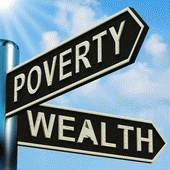The simple answer appears to be "yes" -- in certain circumstances. The research supporting this conclusion was not conducted by Occupy Wall Street, but at the University of California, Berkeley, where social psychologist Paul Piff and a team of graduate students devised a series of experiments to assess the effect of wealth on ethical behavior. Their paper, published at the end of February in the Proceedings of the National Academy of Sciences, suggests that the rich are more likely to cut corners than others when confronted with a number of ethical challenges.
In the initial phase of the study, students watched traffic at a four way intersection, where they observed that people driving expensive cars (a reliable indicator of economic status) were twice as likely to illegally cut off other drivers and only half as likely to stop for pedestrians in a crosswalk than those driving humbler models.
Most of us won't be surprised to learn that drivers of fancy cars are menaces. But what would that Maserati hotshot do if he stopped at a convenience store for a can of soda and the clerk handed him back more change than he was due? The UC study found, surprisingly, that the well-off were more likely to pocket the change than the poorer respondents, who generally said that they would return it.
In a third trial, 108 participants were recruited from Craigslist to play an online game whose winners were awarded $50. Higher income individuals lied more frequently, inflating their scores to get the prize money than their less affluent counterparts.
The study also tested people's willingness to accept better grades than they had earned, to lie to job applicants in order to earn a larger bonus, even to pilfer candy from a jar meant for children. In all cases, the wealthier you were the more likely you were to behave badly.
So what's the deal -- are the rich less ethical than the rest of us? Not necessarily, according to Piff. But they do have a greater sense of personal entitlement. If you have money, you come to see it as your due. The affluent view wealth as a virtue, and their own wealth as proof of their own hard work and innate worth. They are rich, in other words, because (in their own minds at least) they deserve it.
And because their feeling of self worth are tied to their ability to acquire wealth, the rich often feel driven to continue to do so -- long after their most lavish material desires are met. The insane feeding frenzy on Wall Street prior to the crash may be less about greed than a species of machismo. Money, for the rich, is not just a medium to purchase things; it is a measure of status in that rarefied world where you are judged by the heft of your take home pay.
"It's not that the rich are innately bad," Piff said, "but as you rise in the ranks -- whether as a person or a nonhuman primate -- you become more self-focused."
And also isolated, cut off from others and from the standards of the community at large, the study concluded. Unlike the poor, who have to rely on their network of friends, family and neighbors to help them get through tough economic times, wealth buys one a certain independence from others. The rich don't have to make the same compromises and accommodations as the rest of us do. They are accustomed to getting their own way. They are also used to getting away with things. Witness the bafflement, then outrage on Wall Street when it was suggested that the big wheels there who had acted fraudulently should be held criminally accountable for their misdeeds.
Living in a bubble of extreme wealth also fosters what has been called "the compassion deficit." As one gets richer, it becomes increasingly difficult to identify with those in need. Romney's statement that he was not worried about the poor, because they are protected by the safety net is a case in point. As the income gap widens, many are losing their ability even to imagine what life might be like on the other side of the divide.
This may account for the fact that the poor are more charitable than the rich. One can see this every day on the streets of America's cities, where people who are lower on the socio-economic totem pole give more frequently to the homeless and street performers than those who are well off. Upper-income Americans contribute only 2.7 percent of their income to charity, in contrast to the 4.2 percent given by people in lower income brackets. And a large portion of what the rich do give goes to cultural institutions and to their alma maters rather than helping those in need, according to a 2007 report from the Center on Philanthropy at Indiana University.
Folks who are struggling to make ends meet have a natural empathy for others who are in a similar position. They know what it means to be hungry, homeless and out of work, and cannot pass those who are even more hard-pressed than they without thinking "There but for the grace of God go I." This is not a thought that easily comes to the minds of the well-to-do.
In the wake of Occupy Wall Street, the media spotlight has focused on economic inequity in America. But the huge disparity in wealth may reflect an even more fundamental gap in our minds and hearts. The latest UC research suggests that the distance between the rich and the poor is more than just economic -- it is psychological as well. Rich and poor Americans are inhabiting different worlds of experience -- a caste system of sympathy, of values and of ethical sensibility which is becoming increasingly difficult to bridge.





